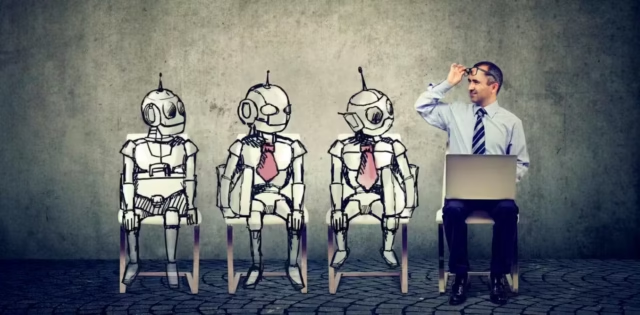Artificial intelligence has arrived at a critical juncture, and senior executives aren’t shying away from admitting its disruptive power, including the fact that AI threatens corporate jobs globally. From blue-chip firms to financial giants, white-collar roles are increasingly at risk, reshaping the labour market and prompting urgent calls for policy action and workforce retraining.
White‑Collar Workforce on Edge
In a recent internal memo, Amazon CEO Andy Jassy made headlines by warning that the integration of intelligent agents and generative systems into company operations would lead to a leaner corporate workforce over the next few years. With roughly 350,000 white‑collar employees in his sights, Jassy urged staff to “educate yourself” in technological tools—a plea for adaptation in what many see as an impending transformation.
The ripple effect is evident across sectors. Goldman Sachs has already launched a firmwide assistant tool, framed as a productivity enhancer, but sparked concerns about the broader implications for roles in investment banking and analysis. Similarly, IBM, JPMorgan Chase, Meta, and Salesforce executives have all acknowledged that corporate positions—particularly in customer service, data processing and routine engineering—are vulnerable to automation.
These industry shake‑ups follow predictions from leading thinkers like Anthropic’s CEO, who recently warned that up to half of entry‑level white‑collar positions could vanish within five years. If realised, unemployment among young professionals could spike dramatically—a scenario that rings alarm bells as graduates enter a fiercely competitive job market.
Entry‑Level Roles Shrinking
The early‑career job market is already showing signs of strain. In the UK, new data reveals a 33% drop in graduate‑level vacancies compared to last year, marking the lowest point in seven years . Indeed, recent college grads there are grappling with fewer job postings, flat hiring trends and an undeniable link to automation pressures.
Down under, Australian graduates tell similar tales. One data‑science graduate recounted that instead of large junior teams, many companies now hire one junior supported by machine‑learning systems. Experts suggest this shift is accelerating demand for technical adaptiveness even at the entry level.

Displacement vs. Creation
Despite fears of widespread displacement, some economists urge caution. Nobel laureates Martin Wolf and Paul Krugman argue in a recent Financial Times exchange that history shows economies adapt, and alarmist projections often overstate the impact. They concede that short‑term disruptions are likely—particularly for recent graduates—but note that long‑term job creation often follows initial shocks.
Echoing this balance, a Canadian computer science professor described smart tools not as adversaries, but as collaborators. She believes that while repetitive tasks will be captured by machines, the enhancement of human expertise may lead to new roles that rely on oversight, validation and specialised judgment. PwC’s recent Global AI Jobs Barometer also supports this nuanced view: many jobs deemed “AI‑exposed” still command wage premiums, but success will hinge on continuous up‑skilling.
Corporate Caution and Strategy
Acknowledging both the threats and opportunities, companies are trying to strike a balanced tone. Goldman Sachs stresses that its digital assistant is a tool to “free employees to focus on higher‑value work.” Similarly, Amazon’s spokespersons frame internal memos as early warnings, urging staff to embrace change rather than bracing for mass layoffs.
However, real‑world adoption hasn’t always followed a smooth path. A survey of banking executives revealed that while AI could eliminate hundreds of thousands of back‑office roles in the next few years, many institutions still rely heavily on human validation—a mismatch between promise and practice. Moreover, businesses report ambiguity in quantifying productivity gains, even as investment in automation continues.
Policymakers and the Skills Gap
The mounting implications have not gone unnoticed by governments and international bodies. Studies by the OECD and IMF estimate that a significant share of professional roles—particularly those requiring degrees in medicine, law, finance, and IT—are vulnerable to technology-driven disruption. The UK Employment Secretary is calling for substantial investment in training to address the decline in entry‑level opportunities.
Meanwhile, proposals like an “AI Marshall Plan” for global coordination have emerged from think‑tanks and legislative factions, echoing 20th‑century infrastructure drives, and aiming to buffer societies against rapid disruption. These plans emphasise a blend of regulation, research investment and re‑training programs.

Looking Ahead
For workers—from seasoned managers to fresh graduates—the message is clear. Those who navigate the shift thoughtfully, embrace lifelong learning, and understand how to leverage intelligent systems may thrive. But those unprepared could find themselves edged out by a digital productivity wave.
Short‑term turbulence seems likely, with roles in data entry, analysis, writing, and routine coding most immediately affected. But longer-term prospects remain murky: will new jobs match losses? Will economies adapt swiftly enough? As the FT panel noted, “true intelligence” in machines is still evolving. Yet the pace of deployment is real—and so is the pressure on the corporate workforce.
Final Thoughts
- AI threatens corporate jobs globally—this is not imminent doom, but a clear signal that white‑collar roles are entering uncharted territory.
- The entry‑level market is tightening, with fewer traditional roles on offer.
- Displacement and augmentation coexist: policy, training and corporate strategy will determine which side dominates.
- For individuals, up‑skilling and adaptability are now essential pillars of career resilience.
As businesses, governments, and individuals weigh the risks and rewards, one thing is certain: the modern office is entering an era where machines and humans must co‑evolve—swiftly, strategically and with empathy.
Join Our Social Media Channels:
WhatsApp: NaijaEyes
Facebook: NaijaEyes
Twitter: NaijaEyes
Instagram: NaijaEyes
TikTok: NaijaEyes













![Tragic Incident: Fans of Seyi Vibez Die in Fatal Accident After Electrifying Lagos Concert [VIDEO] Seyi Vibez](https://naijaeyesblog.com/wp-content/uploads/2025/08/Seyi-Vibez-180x135.avif)























